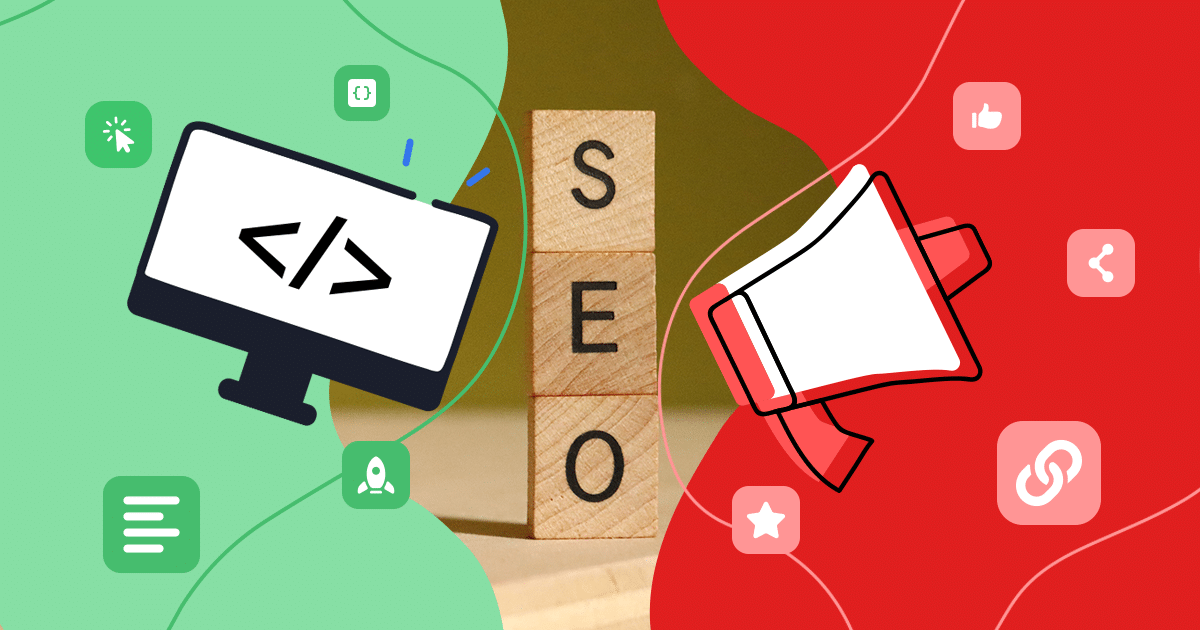On-page SEO is everything that you can directly control on your website, including content, title tags, keyword usage, SEO-optimized URLs, internal links and image alt text. Off-page SEO are actions that happen away from your website, like links and mentions on other websites. The main differences between both types are:
Thank you for reading this post, don’t forget to subscribe!
Please support the blog by clicking ads and join the monetize programs , coming soon.

- On-page SEO elements are within the website’s control, such as title tags, meta descriptions, header tags, and keyword research, while off-page SEO elements are external, such as backlinks, social signals, and online reviews.
Both types SEO are two different sets of SEO factors that aim to improve the ranking of a website on search engines. On the other hand, off-page SEO focuses on increasing the credibility and authority of a website by improving its reputation outside of the website. This includes actions such as link building, social signals, and online reviews 1. Other factors that improve the SEO of your page are the Code and HTML of your web pages. Things that are important in building the page like less using of tables and more using of <div> and <p> to hold text inside. Also Using <iframe> in the page is noi recommended by search engines for they hide the contents from being discovered in the search crawlers. Also the main objective of SEO for contents is to use tables just for tabular data only, and not for design and appearance purposes.
Both types SEO are important for improving a website’s ranking on search engines. Google uses ranking factors that occur both on your pages and outside of them 1. Depending on your needs, you can sometimes focus more on one of those SEO types. But you probably shouldn’t focus on only one of them all of the time.
On-page SEO is a type of search engine optimization that focuses on optimizing web page content for search engines and users. Common practices include optimizing title tags, content, internal links and URLs.

According to Backlinko, it is still important in 2023. Google’s own “How Search Works” report states that Google still uses old-school stuff like looking for a specific keyword on your page 1. However, there’s more to it than cramming keywords into your page’s HTML. To rank your content in 2023, you also need to optimize your content for user experience, bounce rate and dwell time, search intent, page loading speed, and click-through-rate 1.
WebFX suggests that it uses on-site optimizations to improve a page’s rankings in relevant search results. On-site optimizations target a page’s content and source code, and include creating content, inserting keywords, improving page speed, and more 2.
Ahrefs defines it as anything you can do on the page itself to improve its rankings. It focuses on helping Google and searchers better understand and digest your content 3.
What’s the Difference?
On-page SEO
It has some common practices, including optimizing title tags, content, internal links and URLs.
WebFX suggests that it uses on-site optimizations to improve a page’s rankings in relevant search results. On-site optimizations target a page’s content and source code, and include creating content, inserting keywords, improving page speed, and more 2.
Ahrefs defines it as anything you can do on the page itself to improve its rankings. It focuses on helping Google and searchers better understand and digest your content 3.
Off-page SEO
Besides what I mentioned before, it also includes actions such as link building, guest posting, social media marketing, and online reviews.
According to SEMrush, its tactics are applied outside of a website to improve its rankings. The goal of it is to get search engines (and users) to see your site as more trustworthy and authoritative 1. Moz suggests that it involves actions taken outside of your website to improve your search engine rankings. This includes building backlinks, acquiring citations and social mentions, and fostering partnerships with authoritative websites 2. Backlinko defines it as activities done off of a website in an effort to increase the site’s search engine rankings. Common actions include building backlinks, encouraging branded searches, and increasing engagement and shares on social media 3.
It is important for improving a website’s ranking on search engines. Google uses ranking factors that occur both on your pages and outside of them 1. By building high-quality backlinks from reputable sources, you can improve your website’s authority and credibility, which can lead to higher search engine rankings 1.
Why are both types SEO are Important ?

Both types SEO are important for improving a website’s ranking on search engines. Google uses ranking factors that occur both on your pages and outside of them.
Both are types of search engine optimization that focuses on optimizing web page content for search engines and users. Common on-page SEO practices include optimizing title tags, content, internal links and URLs. On the other hand, off-page SEO includes actions such as link building, guest posting, social media marketing, and online reviews.
It is still important in 2023. Google’s own “How Search Works” report states that Google still uses old-school stuff like looking for a specific keyword on your page 3.
It is important for improving a website’s ranking on search engines. By building high-quality backlinks from reputable sources, you can improve your website’s authority and credibility, which can lead to higher search engine rankings.
Techniques of Off-page SEO
this type refers to SEO tactics applied outside of a website to improve its rankings. These tactics often include link building, guest posting, social media marketing, and more 12. The goal of it is to get search engines (and users) to see your site as more trustworthy and authoritative 1.
Here are some techniques that you can use to improve your website’s ranking:
- Link building: This involves getting other websites to link back to your website. The more high-quality links you have, the more authoritative your website appears to search engines 32.
- Social media marketing: This involves promoting your website on social media platforms such as Facebook, Twitter, and LinkedIn. Social media can help you build brand awareness, drive traffic to your website, and improve your search engine rankings 1.
- Guest posting: This involves writing articles for other websites in your niche and including a link back to your website in the article. Guest posting can help you build relationships with other websites in your niche and drive traffic to your website 1.
- Online reviews: Encourage customers to leave reviews of your business on review sites such as Yelp, Google My Business, and TripAdvisor. Positive reviews can help improve your search engine rankings and attract more customers 1.
- Influencer outreach: Reach out to influencers in your niche and ask them to promote your website or products on their social media channels or blogs. Influencer outreach can help you reach a wider audience and improve your search engine rankings 2.
Remember that it is just one part of a comprehensive SEO strategy. You should also focus on on-page SEO techniques such as optimizing title tags, content, internal links, and URLs. By combining both SEO techniques, you can improve your website’s ranking on search engines and attract more traffic.
More Resources of On-Page & Off-Page SEO
- On-Page vs. Off-Page SEO: Different but Equally Important
- The Differences Between On-Page vs Off-Page
- What’s The Difference Between On-page And Off-page ? | UpCity
- What Is Off-Page SEO? A Guide to Off-Page SEO Strategy
- What Is Off-Page SEO? Strategies Beyond Links – Moz
- Off-Page SEO: The Definitive Guide
- What Is On-Page SEO? How to do On-Page Optimization in 2023
- Off Page SEO Techniques – javatpoint
- 20 Off-Page Techniques & Trends in 2023 With Examples
- More about On-Page vs. Off-Page in my blogs here.


Leave a Reply